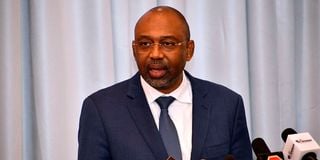Kenya deserves a pat on the back for sustaining immunisation milestones

World Health Organization Country Representative, Dr Abdourahmane Diallo, at a past event in Nairobi.
What you need to know:
- Immunisation is one of the most cost-effective public health interventions with a good return on investment, only second to provision of clean water. This is because it protects people from sickness, saves lives and contributes to the economic growth of nations. This is achieved by development of immunity against diseases in children while still young and hence building a barrier to diseases.
- Over the years and through the Kenya Expanded Programme for Immunisation that was established in 1980, the country adopted new vaccines that have supported efforts to fight diseases such as tuberculosis, pneumonia, diarrhoea, polio, measles, diphtheria, whooping cough, tetanus, hepatitis, meningitis, yellow fever, cervical cancer and malaria.
Since the introduction of routine immunisation services in Kenya in 1980, many lives have been saved and sickness from vaccine preventable diseases averted. Kenya has consistently increased the number of children reached with vaccines and expanded the number of vaccines in the immunisation schedule.
During Covid-19 pandemic, Kenya’s immunisation programme remained resilient, a status that has been widely lauded, a great compliment for the continuous efforts to maintain and sustain immunisation over the years, particularly the last three, when there was so much disruption and pressure to save and sustain lives throughout the pandemic.
Immunisation is one of the most cost-effective public health interventions with a good return on investment, only second to provision of clean water. This is because it protects people from sickness, saves lives and contributes to the economic growth of nations. This is achieved by development of immunity against diseases in children while still young and hence building a barrier to diseases.
Over the years and through the Kenya Expanded Programme for Immunisation (KEPI) that was established in 1980, the country adopted new vaccines that have supported efforts to fight diseases such as tuberculosis, pneumonia, diarrhoea, polio, measles, diphtheria, whooping cough, tetanus, hepatitis, meningitis, yellow fever, cervical cancer and malaria
Key milestones in introduction of vaccines include:
2002:: introduction of pentavalent vaccine against diphtheria, whooping cough, tetanus, hepatitis B and haemophilus influenza type B
2011:: introduction of pneumococcal conjugate vaccine to protect against pneumonia, meningitis and septicaemia
2013: Introduction of second dose of measles given at 18months
2014: introduction of rotavirus vaccine against diarrhoea in children
2015:introduction of injectable polio vaccine
2016:: introduction of rubella component of measles rubella vaccine
2018: introduction of vaccine against cervical cancer and malaria vaccine in areas with huge burden of malaria
Kenya now provides more than 15 types of vaccines that have helped to combat vaccine-preventable diseases. These vaccines come as single or combined formulations. It has also sustained a relatively good immunisation coverage over the years although it is yet to reach its target of 90 per cent coverage for all vaccines. The coverage for Penta 3, for instance, was at below 60 per cent in 1985 but is at 90 per cent while measles 1 was just above 60 per cent in 1985 but is at 90 per cent.
This is due to various challenges such as distance from health facilities, lack of means of transport, caregivers being too busy to take their children to the vaccinating centres, pockets of refusals, quality and consistency of health services. In the second year of life, the coverage has been generally lower and it seems parents ‘let off’ after children are vaccinated in their first year of life as per schedule of vaccination for multiple reasons. These are varied from one county to another but may include the perception that children are okay after immunisation in their first year of life, the child is in good health status or mother is pregnant or is nursing another baby, logistical challenges to access health services among others.
The uptake of vaccine against cervical cancer targeting adolescent girls aged 10-14 years has been promising. However, reaching all the girls has been an uphill task. Adolescent girls are a unique population that requires tailored messaging and provision of additional services such as health education, teachings on menstrual hygiene …. Most of the girls have been reached with vaccines in schools.
Every year, the world and the African region marks the immunisation week during the last week of April. In Africa, this is marked as the African Vaccination Week and the theme for 2023 is “The Big Catch up”. Thus, all those who missed their vaccines during the Covid-19 pandemic ought to be reached with vaccines.
As the World Health Organization celebrate its 75 years of existence (since 1948) and commemorates the African vaccination week, we commend Kenya for sustaining routine immunisation and for the efforts to raise the coverage to above the 90 per cent mark. Further, we applaud the Government of Kenya for sustaining the uptake of vaccines through Covid-19 pandemic period, a situation that caused other countries to decline as the focus shifted to responding to the pandemic.
We call on all parents, caregivers and the public to ensure that all persons eligible to get vaccines are vaccinated. For those that missed their vaccines for whatever reason, please make deliberate effort to get vaccinated. Those persons at high risk of Covid-19 and high likelihood of getting severe disease are advised to go to the nearest health facility to get their vaccines. Such population groups include health workers, the elderly, persons with underlying diseases like diabetes/cancer/hypertension or any form of immunosuppression.
Dr Diallo is the World Health Organization Kenya Representative. Email: [email protected]




